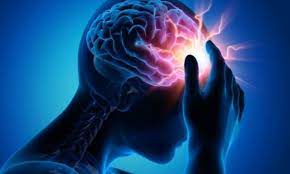Long-COVID News: Study Shows That Even 'Recovered’ Non-Hospitalized COVID-19 Individuals Report Persistent Neurological Symptoms For Weeks.
Long-COVID News: A new study by researchers from Northwestern University, USA showed that non-hospitalized ‘recovered’ COVID-19 patients who had mild or even in some cases asymptomatic conditions when infected with the SARS-CoV-2 coronavirus initially, reportied manifestations of persistent neurological symptoms for weeks after so called recovery!

Typically most SARS‐CoV‐2‐infected individuals never require hospitalization and only exhibit mild or asymptomatic conditions. However, some develop prolonged symptoms even after recovery. The study team sought to characterize the spectrum of neurologic manifestations in non‐hospitalized COVID‐19 “long haulers”.
The study involved 100 patients (50 SARS‐CoV‐2 laboratory‐positive and 50 laboratory‐negative individuals) at the Neuro‐COVID‐19 clinic at Northwestern University between May and November 2020. Due to early pandemic testing limitations, patients were included if they met Infectious Diseases Society of America symptoms of COVID‐19, were never hospitalized for pneumonia or hypoxemia and had neurologic symptoms lasting over 6 weeks. The study team recorded the frequency of neurologic symptoms and analyzed patient‐reported quality of life measures and standardized cognitive assessments.
The mean age of participants in the study was 43.2±11.3 years, 70% were female and 48% were evaluated in televisits. The most frequent comorbidities were depression/anxiety (42%) and autoimmune disease (16%).
The main neurologic manifestations were: “brain fog” (81%), headache (68%), numbness/tingling (60%), dysgeusia (59%), anosmia (55%), myalgias (55%), with only anosmia being more frequent in SARS‐CoV‐2+ than SARS‐CoV‐2‐ patients (37/50 [74%] vs (18/50 [36%]; p <0.001). Moreover, 85% also experienced fatigue. There was no correlation between time from disease onset and subjective impression of recovery. Both groups exhibited impaired quality of life in cognitive and fatigue domains. SARS‐CoV‐2+ patients performed worse in attention and working memory cognitive tasks compared to a demographic‐matched US population (T‐score 41.5 [37, 48.25] and 43 [37.5, 48.75], respectively; both p<0.01).
The study findings confirmed that non‐hospitalized COVID‐19 “long haulers” experience prominent and persistent “brain fog” and fatigue that affect their cognition and quality of life.
The study findings were published the peer reviewed journal: Annals of Clinical and Translational Neurology
. https://onlinelibrary.wiley.com/doi/10.1002/acn3.51350
While the COVID-19 pandemic spreads worldwide, some people who had the infection report persistent symptoms. Others experience neurological symptoms like brain fog, headaches, and dizziness.
However most SARS-CoV-2 infected individuals never required hospitalization. But some of those who recovered develop prolonged and persistent symptoms.
The study team analyzed "
long hauler" patients whose symptoms lasted at least six weeks. The team found persistent neurological sy
mptoms, including brain fog and headache.
To those who are not aware of the term, “Long haulers” are those who have recovered from COVID-19 but experience persistent symptoms. Some report prolonged cough and difficulty breathing, while others have neurological symptoms.
A variety of neurological manifestations have been reported in 36.4 to 82.3 percent of hospitalized COVID-19 patients globally. Apart from neurological symptoms, pulmonary, cardiac, and gastrointestinal dysfunction may persist after acute infection, constituting a "long COVID" syndrome. It is also known as the syndrome of "post-acute sequelae of SARS-CoV-2 infection (PASC)".
It has been found that more than 80 percent of infected patients have limited respiratory symptoms and do not require hospitalization. Despite this, some patients develop persistent and debilitating symptoms.
The study team noted the frequency of neurologic symptoms lasting more than six weeks and analyzed the patient-reported quality of life measures among the participants in the research.
The study team found that after the acute SARS-CoV-2 infection resolved, 85 percent reported at least four ongoing neurological issues, which impacted their daily lives.
The study findings showed that the most common symptom was brain fog, which involves memory problems, a lack of mental clarity, and an inability to focus. About 81 percent of the participants reported ongoing issues with memory and thinking, followed by 68 percent reporting headaches. Over half of the respondents reported problems with smell, taste, tingling or numbness, and muscle ache.
It was also found that the less common symptoms include dizziness (47%), pain (43%), blurred vision (30%) and tinnitus (29%). The team also revealed that most of the study's long haulers were women, with an average age of 43.
The research findings highlights the need for future research, showing that multiple distressing neurological symptoms may happen and persist after the acute phase of SARS-CoV-2 infection, even in those with mild symptoms or who are asymptomatic and do not require hospitalization.
For the latest
Long-COVID News, keep on logging to Thailand Medical News.
